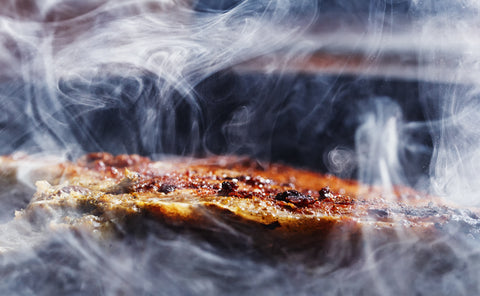Introduction:
Seasoning meat is an art form that can truly transform a dish from ordinary to extraordinary. Whether you're grilling, roasting, or pan-searing, the right combination of herbs, spices, and marinades can enhance the natural flavors of meat and elevate your culinary creations. In this blog post, we'll explore various techniques and methods for seasoning meat to help you take your cooking to the next level.
Dry Rubs:
Dry rubs are a versatile and easy way to season meat. This method of seasoning meat is quite popular when smoking larger cuts of meat (Pork Shoulder, Brisket, etc). Dry rubs consist of a mixture of dried herbs, spices, salt, and sometimes sugar, which are rubbed onto the surface of the meat just before cooking. The key is to ensure even coverage and to make sure the meat is as dry as possible to help the Maillard reaction (if your meat is too wet, it will not brown properly). I would apply a thin layer of mustard to the already brined (and dried) meat first to give the rub something to stick to (you won’t taste the mustard) and help develop a crust (bark) on the meat. Popular dry rub ingredients include paprika, garlic powder, onion powder, cumin, chili powder, and white and/or brown sugar. Experiment with different combinations to suit your taste preferences and the type of meat you're cooking (or simply pick yourself up some Grill Sergeant meat rubs which are ready to go and will elevate your grilling experience to the next level)!
Marinades:
Marinating (it’s true - you use a marinade to marinate your meat) meat involves soaking it in a flavorful liquid mixture before cooking. This allows the meat to absorb the flavors and become more tender. Marinades typically consist of an acidic component (such as vinegar, citrus juice, or yogurt), oil, herbs, spices, and aromatics. When using citrus, never marinate for more than 3-4 hours or you’ll end up with an over-tenderized product. Common marinade ingredients include soy sauce, Worcestershire sauce, garlic, ginger, and herbs like rosemary and thyme. Marinate meat for at least a few hours, or preferably overnight, for the best results.
Wet Rubs:
Wet rubs, also known as paste rubs, are similar to dry rubs but include a liquid component to create a paste-like consistency. This can be achieved by mixing dry spices with oil, mustard, honey, or other liquid ingredients. Wet rubs adhere well to the surface of the meat and help to create a flavorful crust when cooked. They're particularly great for grilling and can add a delicious caramelized flavor to the meat.
Wet Brining:
Wet Brining involves soaking meat in a saltwater solution (brine) before cooking. This not only seasons the meat but also helps retain moisture, resulting in juicier and more flavorful dishes. The basic brine consists of water, salt, and sugar, but you can customize it by adding herbs, spices, citrus zest, or even beer or wine for added flavor complexity. Brine meat for several hours to overnight, depending on the size and type of meat.
Dry Brining:
This is my favorite way to properly season large cuts of meat. Similar to Wet Brining (but better), one applies salt directly to a cut of meat at least 12 hours, and sometimes days, in advance. This method not only seasons the meat but also helps retain moisture, resulting in juicier and more flavorful dishes. It accomplishes this by first pulling some moisture from the meat. As that moisture is absorbed back into the meat, it brings the salt back in with it. There is no need to add your rub or even pepper at this stage, as salt molecules are the only ones small enough to actually penetrate the meat. Simply salt your meat, put it in the refrigerator for your preferred amount of time (at least 12 hours or the moisture won’t have time to re-absorb), remove from the refrigerator, rinse off the excess salt, use paper towels (or similar) to dry the meat, add your rub and/or other spices and cook like normal. You’ll be rewarded with tastier and moister meat than you would have otherwise!
Herb and Garlic Butter:
Infuse meat with rich flavors by slathering it with herb and garlic butter before cooking. Simply combine softened butter with minced garlic, chopped herbs like parsley, thyme, and rosemary, salt, and pepper. Spread the butter mixture over the meat (or for poultry even put some under the skin), ensuring it's evenly coated, before grilling, roasting, or pan-searing. The butter melts into the meat as it cooks, imparting a luxurious taste and aroma.
Conclusion:
Mastering the art of seasoning meat opens up a world of culinary possibilities and allows you to create dishes that are bursting with flavor. There are many methods of seasoning that we did not discuss here (Basting, for example), but whether you prefer the simplicity of dry rubs, the depth of marinades, or the richness of herb-infused butter, there are endless ways to enhance the natural flavors of meat and take your cooking to new heights. So, don your apron, fire up the grill, and get ready to impress your friends and family with your newfound seasoning skills!
Seasoning meat is an art form that can truly transform a dish from ordinary to extraordinary. Whether you're grilling, roasting, or pan-searing, the right combination of herbs, spices, and marinades can enhance the natural flavors of meat and elevate your culinary creations. In this blog post, we'll explore various techniques and methods for seasoning meat to help you take your cooking to the next level.
Dry Rubs:
Dry rubs are a versatile and easy way to season meat. This method of seasoning meat is quite popular when smoking larger cuts of meat (Pork Shoulder, Brisket, etc). Dry rubs consist of a mixture of dried herbs, spices, salt, and sometimes sugar, which are rubbed onto the surface of the meat just before cooking. The key is to ensure even coverage and to make sure the meat is as dry as possible to help the Maillard reaction (if your meat is too wet, it will not brown properly). I would apply a thin layer of mustard to the already brined (and dried) meat first to give the rub something to stick to (you won’t taste the mustard) and help develop a crust (bark) on the meat. Popular dry rub ingredients include paprika, garlic powder, onion powder, cumin, chili powder, and white and/or brown sugar. Experiment with different combinations to suit your taste preferences and the type of meat you're cooking (or simply pick yourself up some Grill Sergeant meat rubs which are ready to go and will elevate your grilling experience to the next level)!
Marinades:
Marinating (it’s true - you use a marinade to marinate your meat) meat involves soaking it in a flavorful liquid mixture before cooking. This allows the meat to absorb the flavors and become more tender. Marinades typically consist of an acidic component (such as vinegar, citrus juice, or yogurt), oil, herbs, spices, and aromatics. When using citrus, never marinate for more than 3-4 hours or you’ll end up with an over-tenderized product. Common marinade ingredients include soy sauce, Worcestershire sauce, garlic, ginger, and herbs like rosemary and thyme. Marinate meat for at least a few hours, or preferably overnight, for the best results.
Wet Rubs:
Wet rubs, also known as paste rubs, are similar to dry rubs but include a liquid component to create a paste-like consistency. This can be achieved by mixing dry spices with oil, mustard, honey, or other liquid ingredients. Wet rubs adhere well to the surface of the meat and help to create a flavorful crust when cooked. They're particularly great for grilling and can add a delicious caramelized flavor to the meat.
Wet Brining:
Wet Brining involves soaking meat in a saltwater solution (brine) before cooking. This not only seasons the meat but also helps retain moisture, resulting in juicier and more flavorful dishes. The basic brine consists of water, salt, and sugar, but you can customize it by adding herbs, spices, citrus zest, or even beer or wine for added flavor complexity. Brine meat for several hours to overnight, depending on the size and type of meat.
Dry Brining:
This is my favorite way to properly season large cuts of meat. Similar to Wet Brining (but better), one applies salt directly to a cut of meat at least 12 hours, and sometimes days, in advance. This method not only seasons the meat but also helps retain moisture, resulting in juicier and more flavorful dishes. It accomplishes this by first pulling some moisture from the meat. As that moisture is absorbed back into the meat, it brings the salt back in with it. There is no need to add your rub or even pepper at this stage, as salt molecules are the only ones small enough to actually penetrate the meat. Simply salt your meat, put it in the refrigerator for your preferred amount of time (at least 12 hours or the moisture won’t have time to re-absorb), remove from the refrigerator, rinse off the excess salt, use paper towels (or similar) to dry the meat, add your rub and/or other spices and cook like normal. You’ll be rewarded with tastier and moister meat than you would have otherwise!
Herb and Garlic Butter:
Infuse meat with rich flavors by slathering it with herb and garlic butter before cooking. Simply combine softened butter with minced garlic, chopped herbs like parsley, thyme, and rosemary, salt, and pepper. Spread the butter mixture over the meat (or for poultry even put some under the skin), ensuring it's evenly coated, before grilling, roasting, or pan-searing. The butter melts into the meat as it cooks, imparting a luxurious taste and aroma.
Conclusion:
Mastering the art of seasoning meat opens up a world of culinary possibilities and allows you to create dishes that are bursting with flavor. There are many methods of seasoning that we did not discuss here (Basting, for example), but whether you prefer the simplicity of dry rubs, the depth of marinades, or the richness of herb-infused butter, there are endless ways to enhance the natural flavors of meat and take your cooking to new heights. So, don your apron, fire up the grill, and get ready to impress your friends and family with your newfound seasoning skills!


